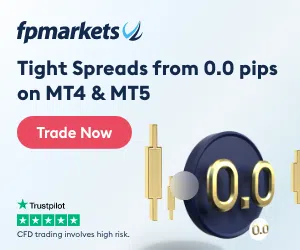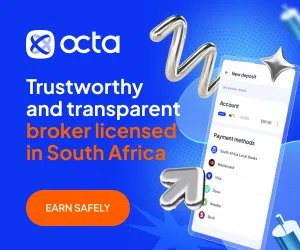-
Best Forex Brokers
Our top-rated Forex brokers
-
Brokers for Beginners
Start trading here
-
Forex Demo Accounts
Learn to trade with no risk
-
ZAR Trading Accounts
Save on conversion fees
-
Lowest Spread Brokers
Raw spreads & low commissions
-
ECN Brokers
Trade with Direct Market Access
-
No-deposit Bonuses
Live trading with no deposit
-
High Leverage Brokers
Extend your buying power
-
Islamic Account Brokers
Best accounts for Muslim traders
-
Market Maker Brokers
Fixed spreads & instant execution
-
All Trading Platforms
Find a platform that works for you
-
TradingView Brokers
The top TradingView brokers
-
MetaTrader4 Brokers
The top MT4 brokers in SA
-
MetaTrader5 Brokers
The top MT5 brokers in SA
-
cTrader Brokers
The top cTrader brokers in SA
-
Forex Trading Apps
Trade on the go from your phone
-
Copy Trading Brokers
Copy professional traders

Forex trading is the largest retail trading market in the world and the proliferation of online brokers in recent years has made it more accessible than ever. This short guide to getting started will explain how to:
- Choose a South African broker
- Use a demo account
- Study beginner Forex trading articles
- Develop a trading strategy
- Manage risk
It’s important to remember that Forex trading is not a get rich quick scheme – it is a long-term investment strategy and if you want to be successful you will have to be careful and smart, especially if you are starting out small.
By the time you have finished this article you will have chosen a good broker, opened a demo account, started educating yourself and you will be ready to open a live trading account. With a little education, caution and focus anyone can learn how to trade successfully – here’s how to do it.
1. Choose a broker that’s right for you
The first thing you want to look for in a broker is whether and how it is regulated.
There are many other international regulatory bodies, such as the South African Financial Services Conduct Authority (FSCA). The FSCA’s role in the South African financial services industry is essential – it assures that regulated brokers treat all clients fairly. A client of an FSCA-regulated brokerage who feels they have been cheated has a legally defined process to resolve their issue – all FSCA regulated entities must have this process available to potential clients.
FSCA regulated brokers must also present written material in a way that does not confuse or mislead the reader. They are required to provide financial education and promote the financial literacy of potential clients. As financial products can be complicated, it is the obligation of any FSCA regulated broker to explain all products and their associated risks. For more detail on the FSCA’s role and their importance to keeping Forex trading in South Africa fair and secure, read our article on the best FSCA regulated Forex brokers.
There are multiple regulation agencies worldwide, some of them well respected and others less so. The best brokers will be regulated by at least one of the big three: The United Kingdom Financial Conduct Authority (FCA), the Cyprus Securities and Exchange Commission (CySEC) and the Australian Securities and Investment Commission (ASIC).
Other regulatory bodies that you will often see are the Seychelles Financial Services Authority (FSA), the Cayman Islands Monetary Authority (CIMA), and the British Virgin Islands Financial Services Commission (BVI FSC) and, while these regulators are generally well-regarded, they are not held in such high esteem as the FCA, CySEC or ASIC.
Make sure you choose a broker that is regulated by at least one of the big three as well as the FSCA; or if you don’t, make sure that you have a very good reason for doing so.
There are many brokers to choose from and not all of them are going to be right for you. Luckily, we have honest, detailed reviews of all the best brokers in South Africa right here for you to peruse. It’s important to find one that matches your needs, so we review them for:
- how trustworthy they are
- how good they are at educating their clients
- what kind of analytical material they provide
- what their trading conditions are like
- what kind of fees you can expect
- what software/platforms they support
It’s very important to check out our guide to the best Forex brokers for beginners. Not only do we list our favourite brokers for new traders, but we also go into detail on what you should watch out for as a new trader when looking for a broker. Our reviews are totally unbiased and we only work with regulated entities so you can be assured that whichever one you choose, your money will be safe.
Other important things to consider when choosing a broker is whether their trading platform is denominated in Rand, whether they have customer support in your mother tongue, what the minimum deposit is and what kind of technical support they offer.
2. Open a demo account
Once you have chosen a well-regulated broker with the right customer support and trading conditions that you require, it is time to open a demo account. If you’re having trouble choosing one with a good demo account, check out our article on the Forex brokers with the best demo accounts.
Demo accounts are not just for playing – they should be used as a serious educational tool. Most brokers offer unlimited demo accounts with 100,000 USD (or equivalent) virtual money to get started. This should be more than enough for you to learn how the broker’s platform operates and the basics of trading. Keep your demo account open and use it often, even once you have opened a live account, as it’s a great testbed for new strategies or unfamiliar currency pairs.
3. Educate yourself
This is of the utmost importance. Once you have chosen a broker and opened a demo account you need to start educating yourself. Read/watch as much as you can; read through our guide to Forex trading in South Africa – it’s a great place to start.
If you followed our guide to the best Forex brokers for beginners you will have chosen one with an excellent education section: Take advantage of this. Many will have video tutorials and even host webinars.
I often say that you can never be too educated when it comes to Forex trading; everything you learn will only help you trade better and more profitably. Learn the difference between fundamental analysis and technical analysis, learn how to manage your risk effectively, learn how the charting tools work on your platform, learn how copy trading and algos can make you more successful, learn how the market reacts to government data releases. If you are going to be a successful trader, you will never stop learning, so make educating yourself a habit.
4. Decide on your trading strategy
There are many Forex trading strategies, and there is no such thing as the “best” strategy – it’s very dependent on your own personality and lifestyle. Read through our piece on how to place your first Forex trade for a good understanding of the building blocks of a successful strategy.
The two major strategies are:
- Scalping – this is the practice of dipping in and out of the market a few times a day and taking small profits from small market moves. This requires constant focus and keeping a close eye on data releases/news events that will affect the market. This strategy is exhausting and time-consuming, but it does work. Even if the individual profits aren’t huge, they do add up over time.
- Positional Trading – this is the practice of keeping a position open for the long-term – often weeks at a time. This is less time-consuming than scalping but requires you to have a good idea of which way the market is going to move over a long period of time. This can also be a particularly stressful form of trading, as you will be tempted to close your trade when the market moves against you in the short-term. If you know the market and are confident in your predictions you will learn to hold firm.
There are many more complex strategies that you will come across, but educate yourself before trying to use them, they require a solid understanding of the market and a number of analytical tools that can be added to your platform.
You should always try out a strategy on a demo account for some time before taking it live – make sure that it’s successful, at least most of the time, before you start spending your own money.
Remember that Forex trading requires a lot of trial and error. To be successful, you are going to have to try a number of different strategies before you find the right one, or combination, that works for you.
5. Decide how much you can afford to lose
So, you have a good broker, you have a good understanding of the market and you have a trading strategy that has worked well with your demo account. Now you have to decide how much you can afford to lose – and I mean that in the nicest possible way.
The Forex market can be a cruel and unforgiving place to those who enter it without the requisite caution. Never put more than you can afford to lose into your trading account and never trade more than you want to lose in a single trade. Make sure trading isn’t going to be painful for you and you will have a lot less stress and a lot more fun.
A good rule of thumb is to never trade more than 5% of your account on any given day and never trade more than 2% of your account on a single trade.
6. Open your live account!
When you open a live trading account you will be asked for a number of things:
- Proof of identification – make sure you have a valid government issued photo ID with you, such as a passport or driving licence.
- Proof of residence – you will also need your proof of residence, this is usually a utility bill (not a mobile phone bill) from the last three months.
- Your job and salary – most good brokers will also want to know what kind of work you do and your salary, so they can judge your suitability for Forex trading. It’s very rare that you will be rejected based on these criteria but do listen to any feedback you receive.
- Payment/Withdrawal method – most brokers accept Visa/MasterCard/Maestro and wire transfers from your bank but many will also accept Neteller/Skrillex. Be aware that some methods of payment/withdrawal will have a fee attached.
You will also be asked to fill out an application – this may include problem-solving questions and other tests to determine your mathematical ability and financial knowledge and may impact the amount of leverage you are offered. Once completed, it may take 24 hours before your application is approved.
Once you have approval from your broker you can go ahead and place your first trade. Congratulations and best of luck! Welcome to the most exciting trading market in the world.
Stay updated
This form has double opt in enabled. You will need to confirm your email address before being added to the list.




























